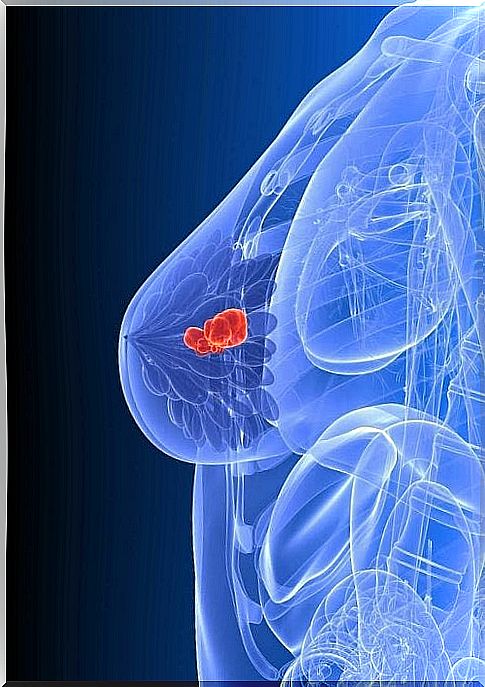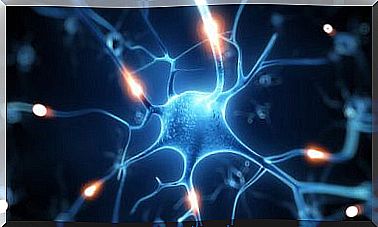BRCA-1 And BRCA-2 Genes And Breast Cancer

Scientists are currently studying the BRCA-1 and BRCA-2 genes to try to assess the severity of breast cancer. Mutations of these genes worsen the prognosis during the disease.
The BRCA-1 and BRCA-2 genes are a pair of genes in the human genome that produce proteins, and their job is to slow down tumor growth. The proteins encoded by these two genes help repair any damaged DNA fragments. They ensure the stability of the genetic material of each cell.
As with any other part of the genetic material, mutations and changes can occur in the BRCA-1 and BRCA-2 genes. This means that their structure can change and become inactive. When that happens, they are no longer able to code for proteins that can synthesize and repair DNA.
This increases the risk of genetic changes in other cells in the body that can lead to cancer development. Mutations of these genes increase the risk of breast and ovarian cancer in particular.
BRCA-1 and BRCA-2 genes – triple negative breast cancer
Triple negative breast cancer is a type of breast cancer in which no receptors normally found during the cancer develop. Thus, there is no overexpression of progesterone receptors, estrogen or HER-2 receptors.
This type of cancer is currently the worst prognosis because the only way to treat it is through chemotherapy.
Triple negative breast cancer accounts for 12-17% of all breast cancer cases. It multiplies quickly and has a great ability to generate metastasis. This fact, combined with treatment difficulties, translates into poor prognosis for patients.

One of the most common molecular reactions in this type of tumor is changes in the functioning of BRCA proteins. More than 8% of breast cancer patients with a hereditary BRCA-1 mutation develop triple negative breast cancer.
In addition, studies indicate that BRCA-1 or BRCA-2 mutations are inherited by approximately 15% of ovarian cancer patients and 5% of breast, pancreatic or prostate cancer patients.
Treatment of triple negative breast cancer with mutations in BRCA-1 and BRCA-2 genes
In December 2014, medical authorities authorized the use of olaparib as monotherapy in the treatment of ovarian cancer with mutations in the BRCA-1 and BRCA-2 genes at an advanced stage.
In examining the results of such therapy, scientists analyzed the efficacy of this drug in advanced breast cancer in previously treated patients with mutations in the BRCA-1 and BRCA-2 genes.
Using the maximum dose of olaparib (400 milligrams every 12 hours, in capsules), the researchers observed an objective drug response rate of 54% in patients with triple-negative breast cancer. This gives hope that 7 out of 13 patients will respond well to the drug.
Other changes that affect the BRCA protein
In addition to mutations in the above-mentioned genes, there are also other changes that may be responsible for the abnormal functioning of BRCA proteins. One is methyl contamination in these genes. This means that the promoter of these genes acquires a methyl chemical group, CH3-.

(A gene promoter is an area in DNA that controls the initiation of transcription of a specific portion. Put simply, it’s the portion of DNA that starts RNA to produce certain types of proteins. )
Thus, due to methyl contamination, genes are unable to synthesize proteins responsible for inhibiting tumor growth. Researchers observed methyl contamination of the promoter of the BRCA-1 and BRCA-2 genes in several types of malignant tumors:
- 5-20% of ovarian tumors,
- 50% of cancers of the digestive system,
- 29-59% of breast cancers.
Summary
BRCA-1 and BRCA-2 genes play an extremely important role in breast oncology. A high percentage of breast cancer patients with changes to these genes have triple negative breast cancer.
They have it whether it occurs due to mutations in their genes or their methyl contamination. Unfortunately, the prognosis of such people is worse because there are still not many treatments developed.
Therefore, continuous research is extremely important, increasing the chance of developing new therapeutic options. In addition, you should also constantly try to find a cure for this disease. The genetic aspect of breast cancer is an area that gives hope, but we still have a long way to go.
Thank you for reading.









